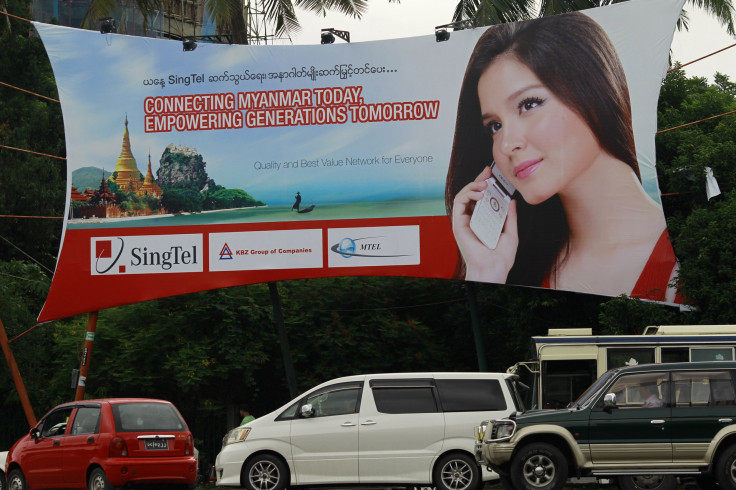Myanmar's Infrastructure, Following Its Economy, To Be Developed Rapidly - 80% Mobile Penetration In 3 Years
With Western trade sanctions lifted, Myanmar is now the investment darling of the world -- in addition to Coca-Cola (NYSE:KO) and Unilever (LON:ULVR), IT and communications companies have all set their eyes on the country as one of the last unconquered frontiers of Asia.
With a population of 60 million, Myanmar currently has a mobile penetration rate of 5 percent. Internet penetration is even lower at around 1 percent, according to PC World.

"When was the last time a market of 60 million people fell out of the sky?" said Martin Sorrell, head of advertising and marketing giant WPP Plc, which has invested in media agencies in Myanmar, according to Reuters. "This is one of the last frontiers."
Indeed, if the rest of Myanmar’s population were to be connected by mobile or Internet, the country could represent a very sizable market for communications and IT companies. What’s more, the development in infrastructure is absolutely necessary for other companies to thrive in the country.
For years, under the military regime, Myanmar’s Internet was heavily censored, and mobile phones, monopolized by state-owned enterprises, were largely inaccessible to the people. Only a year ago, a SIM card in Myanmar could cost $250, and, before that, the price was as high as $2,000, PC World reports.
That is about to change, with the government transitioning to democracy and committing to reforms, which include opening up Myanmar’s mobile Internet market to foreign companies. On Thursday, two foreign firms, out of the 11 short-listed contenders that submitted bids, will receive telecommunications licenses.
Over the next three years, Myanmar’s government hopes to raise mobile penetration to between 75 and 80 percent, PC World reports.
“When the licenses are issued, it’s expected the two operators will hit the ground running,” said Thaung Su Nyein, the managing director of local IT at media company Information Matrix, according to Reuters. “They’ll just sell the hell out of the whole market.”
With the promise of cheaper phone plans not far on the horizon, major mobile phone vendors have readied themselves to meet Myanmar’s future demand, PC World reports.
Samsung Electronics (KRX:005935), the South Korean electronics manufacturer, entered the market last year and held an event to launch its Galaxy S4 smartphone in Myanmar. Taiwan’s HTC (TPE:2498) also opened shops to sell handsets localized with the Burmese language, Myanmar’s official language.
However, for a country where people generally live off low incomes of $80 to $150 per months, these smart phones are nowhere near affordable for the average citizen.
“Low salary is the main problem,” Kaung San, a 49-year-old local resident said, according to PC World. “The Samsung Galaxy S4 is $600. I cannot buy. It’s for rich people.”
“Myanmar people like HTC, iPhone, Samsung,” said Htoo Htet, a saleswoman at a handset store in Yangon, Myanmar’s largest city and its commercial center. But low-priced phones from Chinese handset maker Huawei are the most popular, she said. An average Huawei handset can cost $125.
And it’s not just the foreign firms that are excited for Myanmar’s economic and technological future. Local firms in Myanmar have waited for decades for opportunities brought on by the nation’s shift toward democracy, PC World reports.
Myanmar Information Technology, or MIT, founded in 1997, is one of the few software companies that survived under the country’s military rule, but only barely. Last week, MIT finally made headway by becoming the major supplier of Microsoft (Nasdaq:MSFT) software products in the country.
“I’ve been waiting here for 17 years to have this moment,” Tun Thura Thet, MIT’s CEO, said. “After 10 or 12 years, we almost gave up.” There are only about 10 local software firms in the country, Tun estimated.
Information Matrix's Thaung Su Nyein is also welcoming Myanmar’s transformation.
Thaung, who returned to Myanmar from New York in 1999, remembers the awful days of censorship that threatened to derail his ambition. The authorities had detained people for starting email services and made it illegal to offer any private Internet services.
“Politics was really bad at that time. Basically, you were providing this outside gateway out of the government’s hands,” Thaung said. “This was really dangerous in the eyes of the government. But for the IT business guys, they didn’t even think about that.”
Since the new government took power in 2011, those dark days are over, he related. “The government has ended the strict online censorship and wants Internet and telecommunications to play a major role in developing Myanmar,” Thaung said.
Thaung is optimistic about the future of technology in his country. “We could get tens of thousands of reader on our mobile apps,” he added, according to PC World. “That’s something we are looking forward to.”
© Copyright IBTimes 2024. All rights reserved.




















